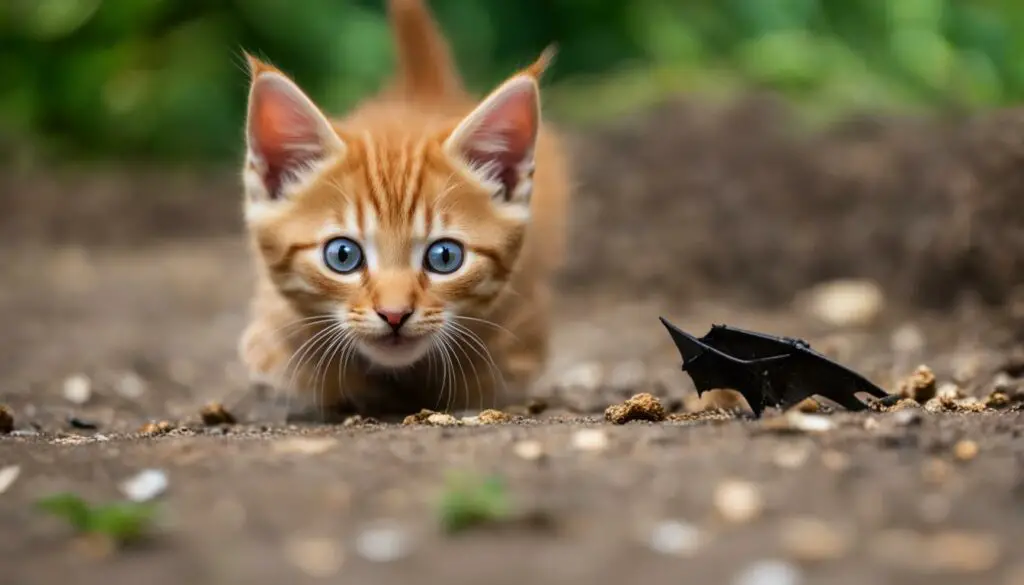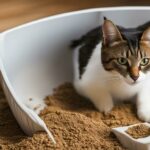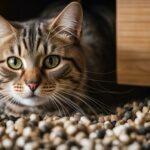Have you ever caught your beloved feline friend playing with their own poop? It may seem baffling and downright disgusting, but this behavior is not as uncommon as you might think. As a cat owner, it’s important to understand why cats engage in this behavior and how we can address it effectively to ensure their well-being.
Cats are fascinating creatures with intricate behaviors, and their tendency to play with poop is no exception. While it may be tempting to dismiss this behavior as gross, it actually serves a purpose for your cat. By unraveling the reasons behind this behavior, we can provide our furry companions with alternative outlets for play and stimulation, promoting a healthier and more harmonious living environment for both cats and their owners.
Key Takeaways:
- Playing with poop is a common behavior displayed by some cats.
- Cats may play with their poop due to curiosity, lack of toys and mental stimulation, or attraction to the smell.
- Strategies to address this behavior include providing interactive toys, maintaining a clean litter box, and using different types of litter.
- The post-poop zoomies and failure to cover poop are related behaviors that can be managed through proper play and litter box training.
- Redirecting your cat’s playful behavior and providing mental stimulation are key to preventing poop play.
3 Reasons Why Cats Play with their Poop
While it may be puzzling and even distressing to discover your cat playing with their poop, there are several reasons why they engage in this behavior. Understanding these reasons can help us address the issue effectively and provide alternative outlets for play and stimulation.
Reason 1: Curiosity and Exploration
First, it’s important to recognize that kittens, in particular, are naturally curious creatures. They have an innate desire to explore their surroundings, and this curiosity extends to anything that catches their attention, including their own feces. It’s not uncommon for kittens to investigate and even play with their poop as they learn about the world around them.
Reason 2: Lack of Toys and Mental Stimulation
Cats that do not have enough toys and mental stimulation may resort to playing with their poop as a form of entertainment. Cats are intelligent animals that require mental stimulation to keep them engaged and prevent boredom. When their environment lacks appropriate toys and outlets for play, they may turn to unconventional items, such as their own feces, to fulfill their need for stimulation.
Reason 3: Attraction to Smell
Some cats are naturally attracted to the smell of their own poop. Certain undigested proteins or other factors in their feces may make it appealing to them. This attraction to the smell can lead to them engaging in play behavior, such as batting or tossing their poop.
It’s essential to address these underlying reasons why cats play with their poop to ensure their well-being and prevent any potential health risks. By providing adequate toys and mental stimulation, you can redirect their play behavior to more appropriate outlets and discourage them from engaging in this undesirable behavior.
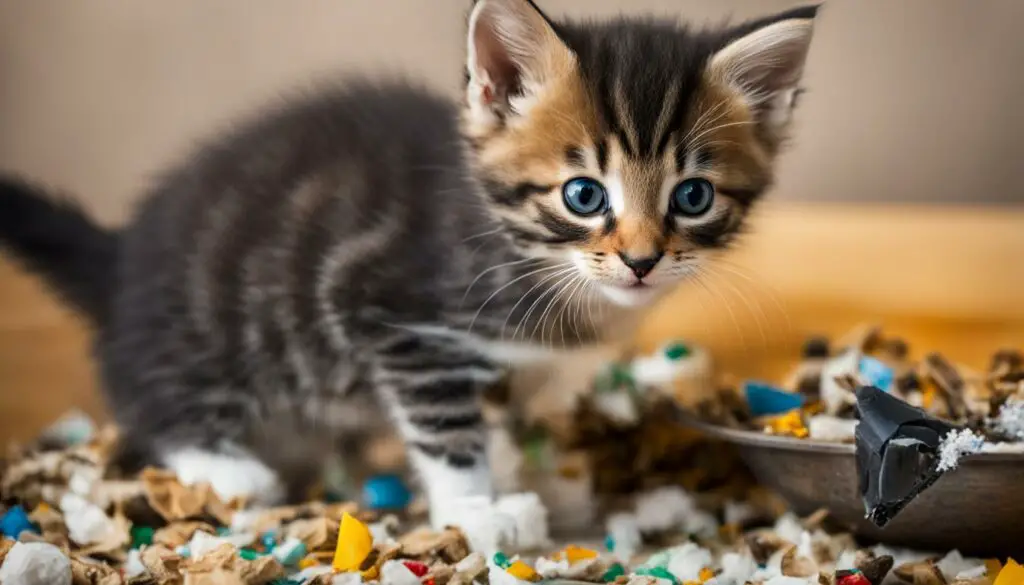
Table: Comparison of Reasons Why Cats Play with their Poop
| Reason | Description |
|---|---|
| Curiosity and Exploration | Kittens are naturally curious and may investigate their feces as part of their exploration of the world. |
| Lack of Toys and Mental Stimulation | Cats without enough toys and mental stimulation may use poop play as a form of entertainment. |
| Attraction to Smell | Some cats are attracted to the smell of their own poop due to certain undigested proteins or other factors. |
How to Stop Your Cat from Playing with Its Poop
If you’ve noticed that your cat has developed a concerning habit of playing with its poop, it’s important to address this behavior promptly. Here are some effective strategies to help you stop your cat from engaging in this unhygienic and unpleasant behavior.
Provide Adequate Play and Mental Stimulation
One of the main reasons cats may play with their poop is boredom or lack of appropriate toys and mental stimulation. Ensure that your cat has a variety of interactive toys to keep them engaged and mentally stimulated. Toys that mimic hunting behavior, such as feather wands or puzzle toys, can be particularly effective in redirecting their play drive.
Maintain a Clean and Odor-Free Litter Box
A clean and well-maintained litter box is essential in preventing poop play. Make sure to scoop the litter box regularly to remove waste and keep it odor-free. Consider using a litter box with a hood or a covered litter box to minimize both odor and accessibility to the poop. Additionally, try using a litter deodorizer or odor-absorbing litter to further discourage your cat from playing with its feces.
Consider Different Types of Cat Litter
If your cat continues to play with its poop despite a clean litter box, you may want to experiment with different types of cat litter. Some cats may have a preference for certain textures or scents, so offering a variety of options can help deter them from using their poop as a plaything. Additionally, adding more litter to the box may discourage your cat from engaging in this behavior.
| Strategies to Stop Cat from Playing with Poop | Effectiveness |
|---|---|
| Provide interactive toys and mental stimulation | High |
| Maintain a clean and odor-free litter box | Medium |
| Try different types of cat litter | Medium |
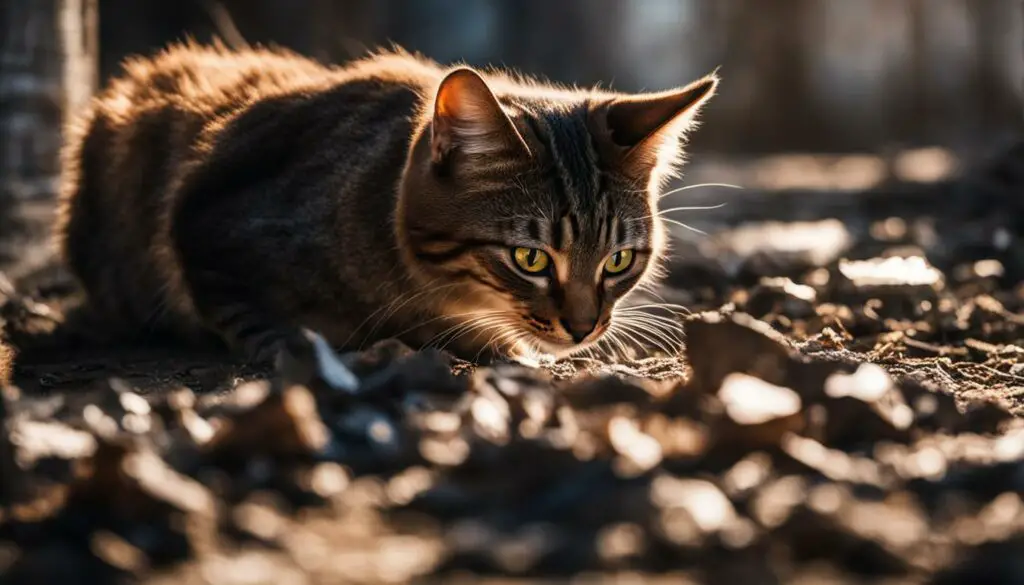
Remember, it’s important to address this behavior promptly to prevent potential health risks and maintain a clean living environment for both you and your cat. If the strategies mentioned above do not yield the desired results, it may be beneficial to consult with a veterinarian or a professional cat behaviorist for further guidance.
Why Do Cats Get Zoomies After They Poop?
After your cat finishes using the litter box, have you ever noticed them suddenly become incredibly energetic? This phenomenon, commonly referred to as “zoomies,” is a natural behavior observed in many cats. The reasons behind this lively post-poop activity can be attributed to a combination of physical relief and positive emotions.
When cats eliminate waste, it provides them with a sense of relief, both physically and emotionally. The act of defecating triggers the release of endorphins, which are feel-good hormones that can elevate their mood and energy levels. This surge of positive emotions can result in increased excitement and playfulness, leading to the infamous zoomies.
During a zoomies episode, cats may engage in various behaviors, such as running around, leaping, and pouncing. This burst of energy is their way of expressing joy and satisfaction after successfully eliminating waste. It’s a sign that they are feeling good and experiencing a sense of wellbeing.
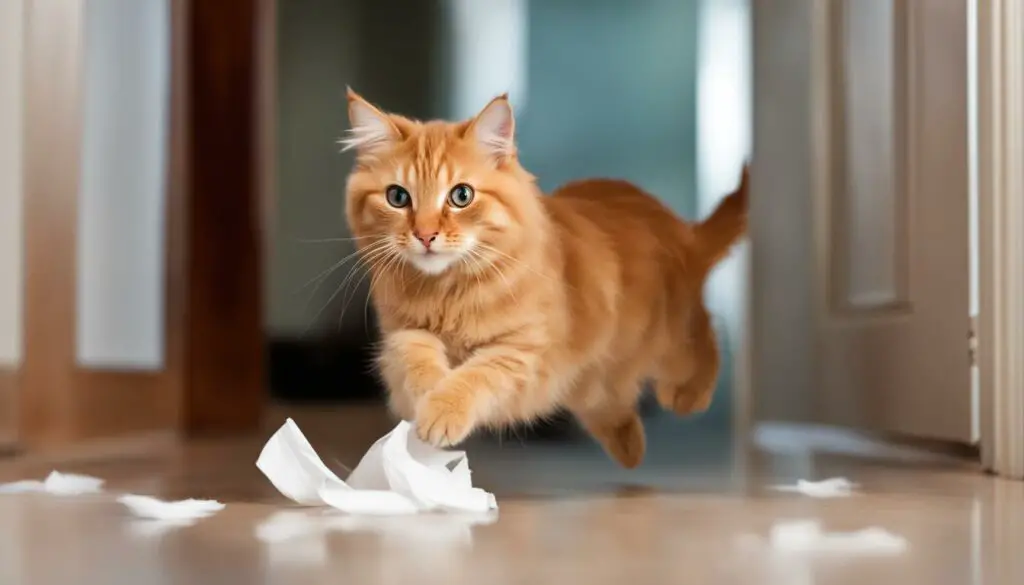
The zoomies after pooping are generally harmless and a normal part of a cat’s behavior. However, if your cat’s zoomies become excessive or aggressive, it may be worth consulting with a veterinarian to rule out any underlying health issues or behavioral concerns.
Why Is My Cat Not Covering His Poop?
When it comes to litter box behavior, it’s not uncommon for cat owners to wonder why their feline friends are not covering their poop. This behavior can be puzzling, but it is important to understand the reasons behind it in order to address any underlying issues. There can be several factors influencing why a cat may choose not to cover their poop, ranging from instinctual to environmental.
One possible reason why a cat may not cover their poop is simply because they have not been trained to do so. Kittens, in particular, may not have learned this behavior yet and require guidance and litter box training. It’s important to be patient and consistent with their training, using positive reinforcement techniques such as treats or praise when they successfully cover their waste.
Another reason why a cat may not cover their poop is to communicate with other animals in the household. Cats have scent glands located in their paws, and leaving their waste uncovered can serve as a territorial marking. This behavior is more commonly seen in multi-cat households where there may be competition for resources. Providing multiple litter boxes and ensuring they are spaced apart can help alleviate this issue.
Environmental factors can also play a role in a cat’s decision to not cover their poop:
- If the litter box is too small or uncomfortable, a cat may feel the need to leave their waste uncovered.
- If the litter box is dirty or has a strong odor, a cat may be less inclined to cover their poop. Regular cleaning and maintenance of the litter box is essential to encourage proper litter box behavior.
- Sometimes, cats may not cover their poop as a way of expressing stress or anxiety. Changes in the household, such as a new pet or a move, can trigger this behavior. Providing a calm and secure environment for your cat can help alleviate their anxiety and encourage them to cover their waste.
To address the issue of a cat not covering their poop, it’s important to consider these factors and make any necessary adjustments to the litter box and environment. Ensuring proper litter box hygiene, providing a comfortable and spacious litter box, and reducing stressors in the household can all contribute to encouraging your cat to cover their waste.
How to Teach Your Cat to Cover Its Poop
If your cat is not covering their poop, you can try teaching them this behavior. Start by sitting beside your cat while they eliminate and gently use their paws to cover the poop. Reward them with a treat immediately afterward to reinforce the desired behavior. Repeat this process several times until your cat learns to cover their poop consistently.
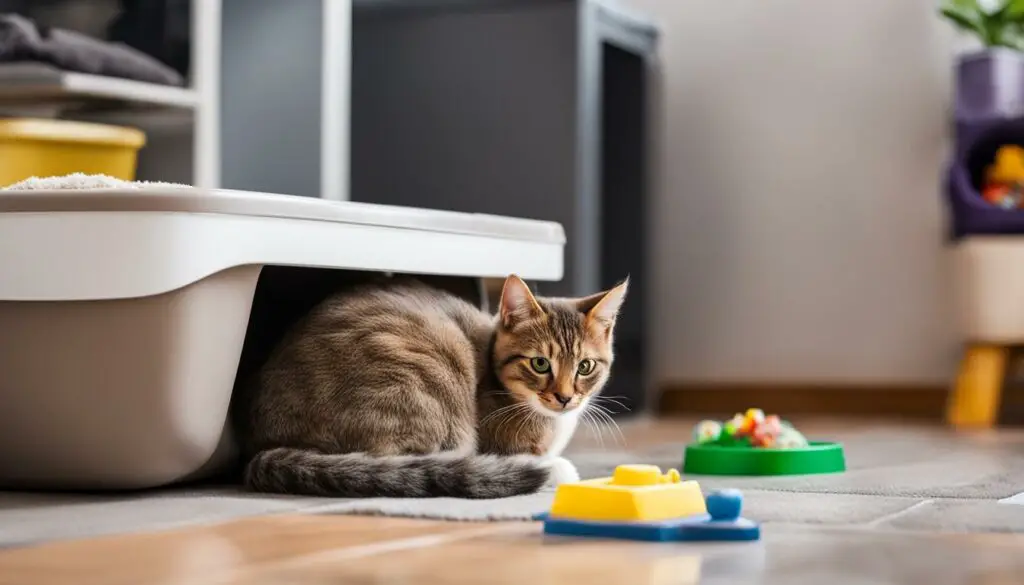
To facilitate the training process, you can also make use of a covered litter box. The cover provides a more confined space for your cat, making it easier for them to understand the concept of covering their waste. Gradually, you can transition back to an uncovered litter box once your cat has mastered the behavior.
Tips for successful litter box training:
- Ensure that the litter box is easily accessible for your cat and placed in a quiet and private area.
- Use a litter substrate that your cat prefers. Experiment with different types of litter to find the one that your cat is comfortable with.
- Clean the litter box regularly to maintain good hygiene and prevent any aversion to using it.
- Consider the number of litter boxes you have in your home. The general rule of thumb is to have one litter box per cat, plus one extra.
Remember, consistency and positive reinforcement are key when training your cat. Be patient and understanding throughout the process, and always reward good behavior. With proper training and a suitable litter box setup, your cat will soon learn to cover their poop consistently.
Kitten Care and Litter Box Training
When bringing a new kitten into your home, it’s important to be prepared for the challenges of litter box training. Kittens are still learning how to navigate their surroundings and may have accidents, including stepping in their own poop. However, with patience and consistency, you can help your kitten develop good litter box habits.
One key aspect of kitten care is providing a suitable litter box. Choose a box that is large enough for your kitten to comfortably move around in and has low sides for easy access. Place the litter box in a quiet and accessible area of your home, away from their eating and sleeping areas. Kittens have a natural instinct to eliminate after meals, so it’s important to have a litter box nearby.
Additionally, consider using a litter specifically designed for kittens. These litters are softer and gentler on their paws, making it easier for them to dig and cover their waste. Avoid using scented litters, as kittens may dislike the strong scent and avoid using the box altogether.
| Litter Box Tips for Kitten Care |
|---|
| Provide multiple litter boxes in different areas of your home to ensure easy access for your kitten. |
| Scoop the litter box daily to keep it clean and odor-free, promoting good litter box habits. |
| If your kitten has an accident outside of the litter box, clean the area thoroughly to remove any lingering odors that may attract them back to that spot. |
Remember, litter box training requires patience and consistency. If your kitten does have an accident or steps in their poop, avoid scolding or punishing them. Instead, gently place them in the litter box and praise them when they use it correctly. With time and positive reinforcement, your kitten will develop good litter box habits and avoid stepping in their poop.
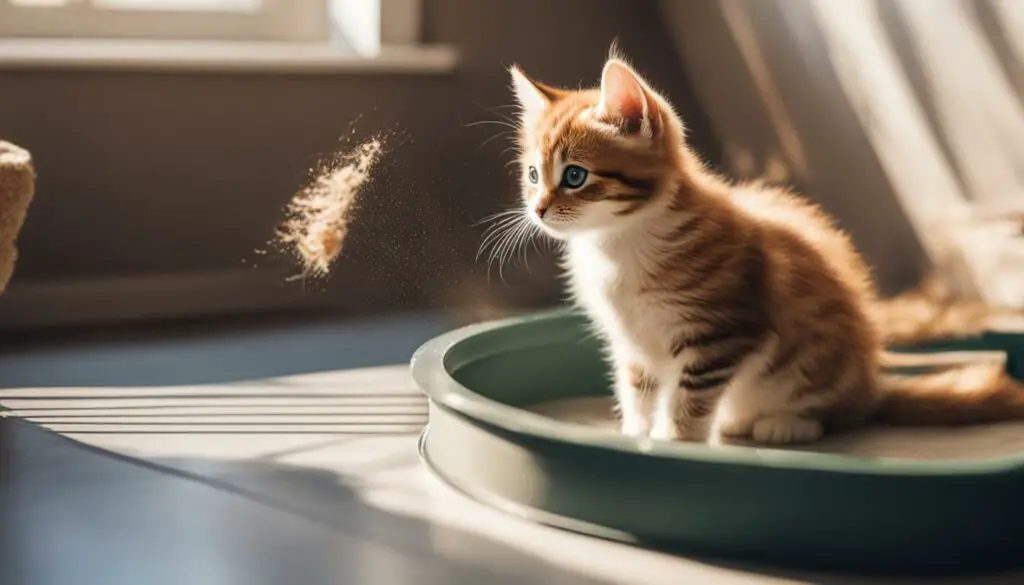
Common Challenges and Solutions
My kitten keeps stepping in its poop. What should I do?”
If your kitten consistently steps in its poop, it may be a sign that the litter box needs cleaning more frequently. Scoop the litter box at least once a day, removing any soiled litter. Consider using clumping litter, which makes it easier to scoop out waste and maintain cleanliness.
“My kitten doesn’t seem to like the litter box.”
There could be several reasons why your kitten is avoiding the litter box. Ensure that the litter box is easily accessible and that there are no obstacles preventing your kitten from using it. Additionally, try different types of litter to see if your kitten has a preference. Some kittens may prefer a certain texture or scent. Gradually transition to a new litter by mixing it with the old litter over a few days.
“My kitten is using the litter box, but not consistently.”
Inconsistency in litter box usage can be due to a variety of factors. Make sure the litter box is in a quiet and private area, away from noisy or high-traffic areas. Additionally, provide positive reinforcement when your kitten uses the litter box correctly, such as offering a treat or praise. If the issue persists, consult with your veterinarian to rule out any underlying health issues.
Why Is My Cat Sleeping Next to the Litter Box?
It can be puzzling to see your cat choosing to sleep next to the litter box. While this behavior may seem unusual, there can be several reasons behind it. One possibility is that your cat feels anxious or stressed and seeks comfort in staying close to their bathroom area. Some cats may also choose to sleep near the litter box as a way to mark their territory and establish a sense of security. This behavior can be more common in cats with health issues or in multi-cat households where there may be competition for litter box access.
To address this behavior, it’s essential to provide your cat with a sense of security and create a calm environment. Consider providing multiple litter boxes in different areas of the house, ensuring easy access for all cats. This can help reduce competition and make your cat feel more comfortable using the litter box. Additionally, providing cozy sleeping areas in other parts of the house, away from the litter box, can help redirect your cat’s sleeping preferences.
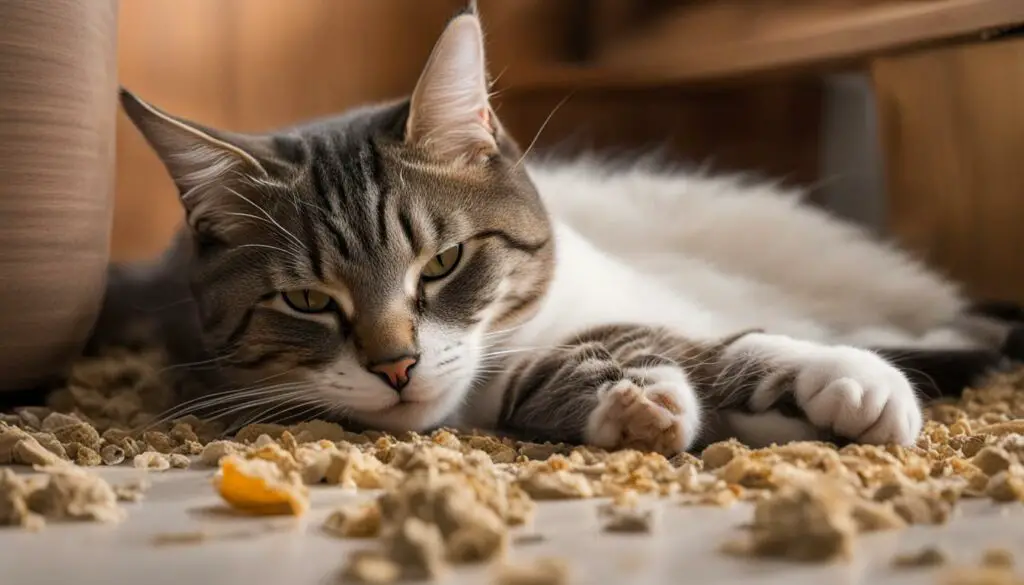
Possible Causes for Sleeping Next to the Litter Box:
- Anxiety or stress
- Marking territory
- Competition for litter box access
By understanding the reasons behind your cat’s choice to sleep next to the litter box and implementing strategies to address any underlying issues, you can help create a more comfortable and peaceful environment for your feline friend.
Is Playing with Poop Normal for Cats?
Playing with poop is not a normal behavior for cats and should be discouraged. While kittens may engage in this behavior as part of their natural curiosity, adult cats should not be playing with their feces. It can be a sign of underlying issues, such as boredom or lack of appropriate toys and stimulation. Understanding the reasons behind this behavior can help us address it effectively and provide alternative outlets for play and stimulation.
Reasons why cats play with poop:
- Kittens are naturally curious and may explore and play with anything that catches their attention, including their own feces.
- Cats that do not have enough toys and mental stimulation may resort to playing with their poop as a form of entertainment.
- Some cats are attracted to the smell of their own poop, finding it appealing due to undigested proteins or other factors.
To stop your cat from playing with its poop, there are several strategies you can try. First, provide your cat with a variety of interactive toys to keep their mind and body engaged. Second, ensure that the litter box is clean and odor-free, as cats may be less likely to play with their poop if the litter box is well-maintained. Third, consider using a different type of cat litter or adding more litter to the box, as this may discourage your cat from playing with their feces.
| Reasons | Strategies to stop poop play |
|---|---|
| Kittens are curious | Provide alternative toys and play outlets |
| Lack of toys and mental stimulation | Provide a variety of interactive toys |
| Attraction to poop smell | Ensure a clean and odor-free litter box |
By addressing the underlying causes of the behavior and providing appropriate alternatives, you can prevent your cat from playing with poop and create a healthier and more enjoyable living environment for both you and your feline friend.
Why Does My Cat Smear Poop?
Smearing poop is a behavior that some cats may display, and it can be associated with playing with poop. Cats may engage in this behavior for various reasons, including territorial marking or communicating with other animals in the household. Understanding why cats smear poop can help us address this issue effectively and find solutions to prevent it from occurring.
To discourage your cat from smearing poop, it is essential to maintain proper litter box hygiene. Scoop the litter box regularly to remove waste and ensure it is clean and odor-free. Consider using an odor-absorbing litter or adding a litter deodorizer to minimize any unpleasant odors that might attract your cat to the feces. A clean and fresh litter box can help discourage the behavior and promote a clean and healthy environment.
In addition to litter box hygiene, providing appropriate outlets for play and stimulation is crucial. Cats may engage in poop smearing due to boredom or lack of mental stimulation. Make sure to provide a variety of interactive toys that can keep your cat mentally engaged and satisfy their play drive. Engage in regular playtime sessions and consider using puzzle toys or hiding treats to stimulate their hunting instincts. These activities can help redirect their energy towards more appropriate outlets and reduce the likelihood of them smearing poop.
Remember, if the behavior persists or becomes a significant concern, it is always advisable to consult with your veterinarian. They can provide additional guidance and recommendations tailored to your cat’s specific needs.
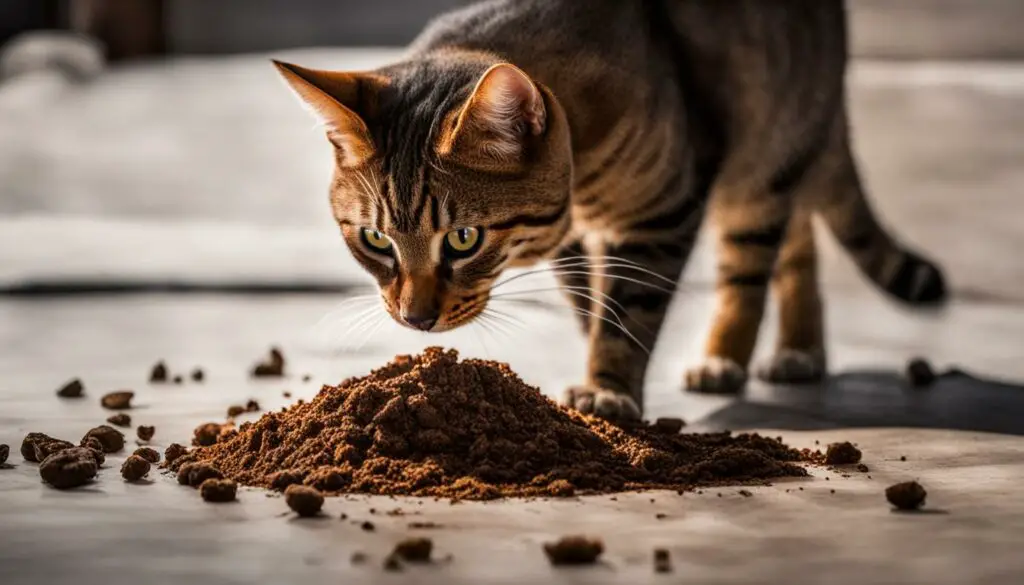
Common Reasons for Poop Smearing in Cats
There can be several reasons why cats engage in poop smearing behavior:
- Territorial marking: Cats may smear their feces as a way to mark their territory, especially if there are other animals in the household.
- Communication: Cats may use poop smearing as a form of communication with other animals in the household.
- Behavioral issues: Some cats may engage in poop smearing due to underlying behavioral issues, such as anxiety or stress.
- Boredom or lack of mental stimulation: Cats that are not adequately stimulated may resort to engaging in undesirable behaviors, such as poop smearing.
By addressing these underlying reasons and implementing appropriate strategies, such as maintaining litter box hygiene and providing mental stimulation, you can help prevent your cat from smearing poop and create a more harmonious living environment.
How to Redirect Your Cat’s Playful Behavior
If your cat has a strong inclination to play with poop, it’s important to redirect their playful behavior towards more appropriate outlets. Providing a variety of cat toys that stimulate their hunting instincts can help satisfy their play drive and reduce the likelihood of them resorting to playing with their feces.
Interactive toys such as toy mice or puzzle toys are great options to engage your cat’s mind and keep them entertained. These toys mimic the movements of prey, allowing your cat to channel their natural hunting instincts in a safe and non-destructive way.
Additionally, regular playtime sessions with your cat using wand toys or laser pointers can provide them with the physical and mental stimulation they need. These interactive play sessions not only help burn off excess energy but also strengthen the bond between you and your feline friend.
Remember, it’s important to provide a variety of toys and rotate them regularly to keep your cat’s interest. Cats can quickly become bored with the same toys, so introducing new toys or changing the arrangement of their play area can help keep them engaged and entertained.
| Benefits of Redirecting Your Cat’s Playful Behavior | Examples of Interactive Cat Toys |
|---|---|
|
|
By redirecting your cat’s playfulness towards appropriate toys and activities, you can help prevent them from engaging in poop play. Remember to always supervise your cat during playtime and remove any potential hazards or small parts that they could swallow. With a little patience and the right toys, you can keep your cat entertained and happy while maintaining a clean and poop-free environment.
The Importance of Mental Stimulation for Cats
Cats are intelligent and curious animals that require mental stimulation to thrive. Providing them with adequate mental enrichment is essential for their overall well-being and can help prevent unwanted behaviors, such as playing with poop. Engaging their minds through interactive play, puzzle toys, and environmental enrichment is crucial for keeping cats mentally stimulated and satisfied.
Mental stimulation helps prevent boredom and provides cats with an outlet for their natural instincts. Interactive toys, such as feather wands or treat-dispensing puzzles, allow cats to engage in predatory behavior and fulfill their hunting desires. These toys can keep cats entertained and mentally challenged, reducing the likelihood of them resorting to playing with their feces.
In addition to toys, environmental enrichment plays a significant role in a cat’s mental well-being. Providing scratching posts, climbing structures, and hiding spots gives cats opportunities for exploration, exercise, and mental stimulation. Creating vertical spaces in your home allows cats to climb and observe their surroundings, simulating their natural habitat. Puzzle feeders or interactive treat-dispensing toys provide mental exercise during mealtime, encouraging problem-solving and keeping cats engaged.
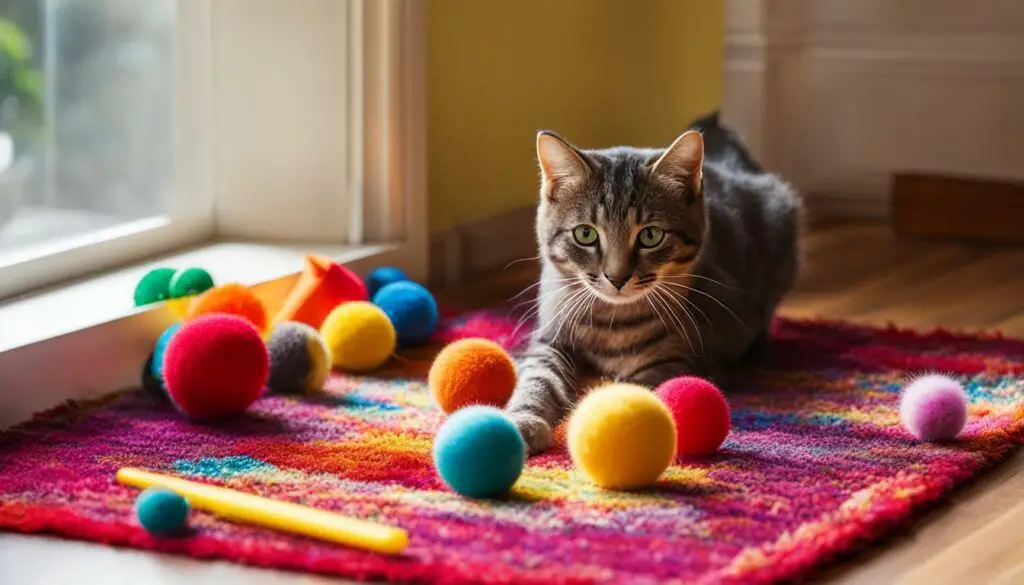
Benefits of Mental Stimulation for Cats
Mental stimulation offers several benefits for cats, including:
- Preventing boredom and destructive behaviors
- Reducing stress and anxiety
- Promoting physical exercise and weight management
- Strengthening the bond between cats and their owners through interactive play
- Providing a sense of purpose and fulfillment
“Mental stimulation through interactive play and environmental enrichment is crucial for keeping cats happy and healthy.” – Dr. Mia Johnson, Feline Behavior Specialist
By incorporating mental stimulation into your cat’s daily routine, you can help them lead a fulfilling and enriching life. Remember to rotate their toys regularly to keep their interest high, and make playtime a fun and interactive experience for both of you. Providing adequate mental stimulation not only helps prevent undesirable behaviors but also contributes to a happy and contented feline companion.
The Role of Litter Box Hygiene in Preventing Poop Play
Proper litter box hygiene is essential for maintaining a clean and healthy environment for your cat. By ensuring that the litter box is clean and odor-free, you can discourage your cat from engaging in undesirable behaviors such as playing with poop. Regularly scooping the litter box to remove waste and completely changing the litter at least once a week can help keep it fresh and inviting for your cat.
It’s also important to consider the type of litter you use. Some cats may be more sensitive to certain types of litter, so it may be worth experimenting with different options to find the one that your cat prefers. Adding a litter deodorizer or using an odor-absorbing litter can help minimize any unpleasant smells that may attract your cat to their poop.
In addition to maintaining a clean litter box, providing your cat with alternative outlets for play and stimulation can also help prevent poop play. Interactive toys, puzzle toys, and environmental enrichment, such as scratching posts and climbing structures, can keep your cat mentally stimulated and engaged. This can reduce boredom and decrease the likelihood of them resorting to playing with their feces.
| Benefits of Proper Litter Box Hygiene: |
|---|
| Fresh and inviting environment for your cat |
| Discourages undesirable behaviors |
| Minimizes unpleasant odors |
| Prevents boredom and negative behaviors |
By prioritizing litter box hygiene and providing your cat with a clean and stimulating environment, you can help prevent poop play and ensure the well-being of your feline companion. Remember to regularly clean the litter box, consider different litter options, and offer plenty of play and enrichment opportunities to keep your cat happy and content.
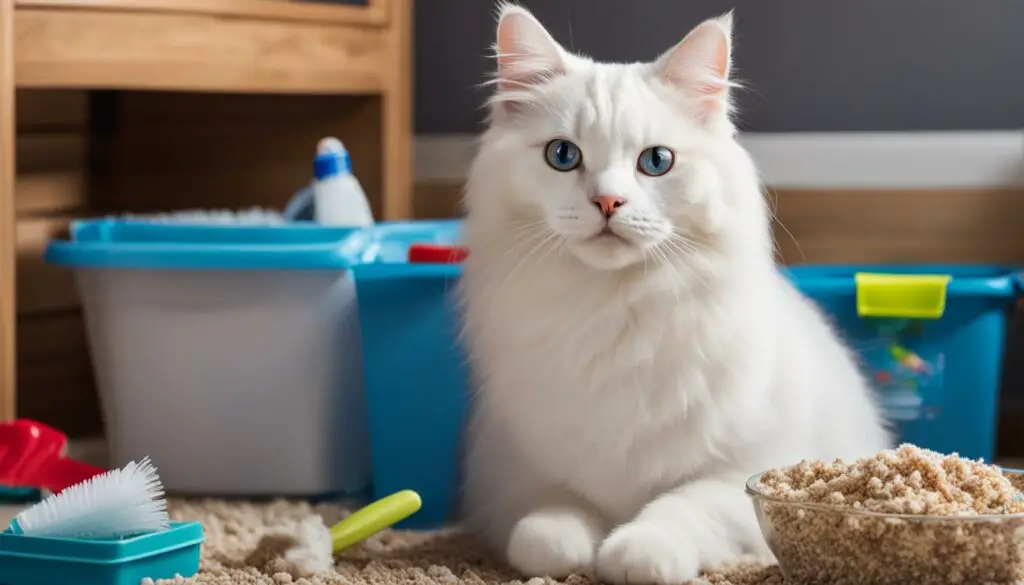
References:
- Rochlitz, I. (2005). A review of the housing requirements of domestic cats (Felis silvestris catus) kept in the home. Applied Animal Behaviour Science, 93(1-2), 97-109.
- Hart, B. L. (1995). Behavioral disturbances of old cats. Veterinary Clinics: Small Animal Practice, 25(2), 427-441.
Conclusion
In conclusion, understanding and addressing the behavior of cats playing with poop is essential for ensuring the well-being of our feline friends. By recognizing the reasons behind this behavior and implementing appropriate strategies, we can create a healthier and more harmonious living environment for both cats and their owners.
To prevent cats from playing with poop, it is important to provide them with alternative outlets for play and stimulation. Interactive toys and regular playtime sessions can help satisfy their natural instincts and prevent boredom. Additionally, maintaining a clean and odor-free litter box is crucial, as cats are less likely to engage in poop play when their bathroom area is well-maintained.
Redirecting a cat’s playful behavior towards appropriate outlets is also key. By offering a variety of interactive toys and engaging in regular play sessions, we can help prevent cats from resorting to playing with their feces. Furthermore, mental stimulation through puzzle toys and environmental enrichment, such as scratching posts and climbing structures, can keep cats mentally stimulated and deter them from engaging in undesirable behaviors.
Lastly, maintaining proper litter box hygiene is essential in preventing poop play and promoting a clean and healthy environment. Regularly scooping the litter box and changing the litter, as well as using odor-absorbing litter or deodorizers, can discourage cats from engaging in this behavior.
In conclusion,
it is important to prioritize the well-being and care of our cats by understanding their behavior and providing appropriate outlets for play and mental stimulation. By doing so, we can prevent cats from playing with poop and create a happy and healthy environment for both cats and their owners.
FAQ
Why do cats play with their poop?
Cats may engage in this behavior due to curiosity, lack of toys and mental stimulation, or attraction to the smell of their own poop.
How can I stop my cat from playing with its poop?
Provide your cat with interactive toys, maintain a clean and odor-free litter box, and consider using a different type of cat litter.
Why do cats get zoomies after they poop?
Cats may display increased activity and playfulness after using the litter box due to the relief and satisfaction they feel.
Why is my cat not covering its poop?
Reasons can include kittens not yet learning this behavior or communication issues with other animals in the household.
How can I teach my cat to cover its poop?
Sit beside your cat while they eliminate and gently use their paws to cover the poop, rewarding them with a treat to reinforce the desired behavior.
When will my kitten stop stepping in poop?
With time and proper litter box training, kittens will gradually develop the skills to eliminate and bury without making a mess.
Why is my cat sleeping next to the litter box?
Cats may do this out of anxiety or competition for litter box access. Providing multiple litter boxes can help alleviate this behavior.
Is playing with poop normal for cats?
While it is not uncommon, playing with poop is not a desirable behavior and may indicate underlying issues such as boredom or lack of stimulation.
Why does my cat smear poop?
Smearing poop can be associated with playing with poop and may be a form of territorial marking or communication with other animals.
How can I redirect my cat’s playful behavior?
Provide a variety of interactive toys, engage in regular playtime sessions, and offer environmental enrichment to satisfy their play drive.
What is the importance of mental stimulation for cats?
Mental stimulation through interactive play, puzzle toys, and environmental enrichment helps prevent boredom and negative behaviors.
How does litter box hygiene prevent poop play?
Regularly scoop the litter box, change the litter, and use odor-absorbing products to maintain a clean and fresh litter box environment.

